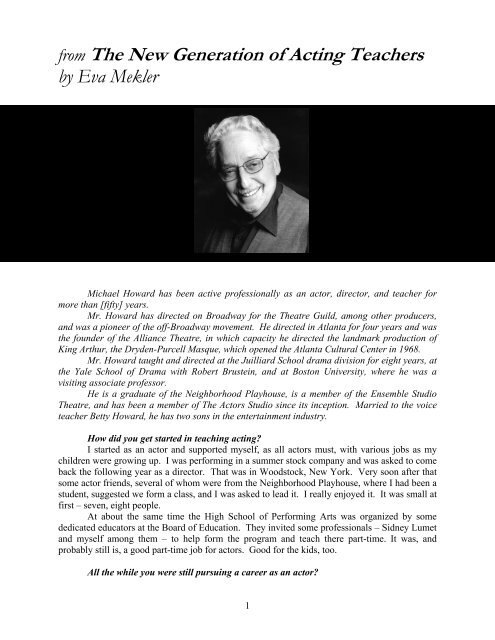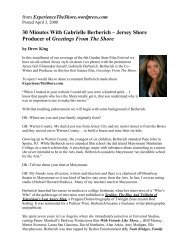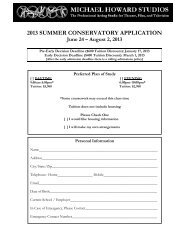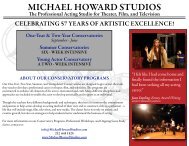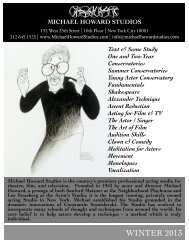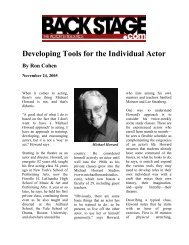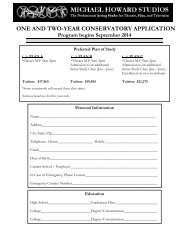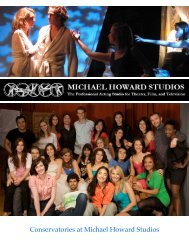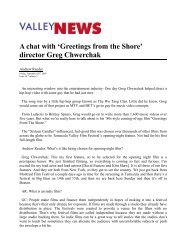from The New Generation of Acting Teachers by Eva Mekler
from The New Generation of Acting Teachers by Eva Mekler
from The New Generation of Acting Teachers by Eva Mekler
Create successful ePaper yourself
Turn your PDF publications into a flip-book with our unique Google optimized e-Paper software.
<strong>from</strong> <strong>The</strong> <strong>New</strong> <strong>Generation</strong> <strong>of</strong> <strong>Acting</strong> <strong>Teachers</strong><br />
<strong>by</strong> <strong>Eva</strong> <strong>Mekler</strong><br />
Michael Howard has been active pr<strong>of</strong>essionally as an actor, director, and teacher for<br />
more than [fifty] years.<br />
Mr. Howard has directed on Broadway for the <strong>The</strong>atre Guild, among other producers,<br />
and was a pioneer <strong>of</strong> the <strong>of</strong>f-Broadway movement. He directed in Atlanta for four years and was<br />
the founder <strong>of</strong> the Alliance <strong>The</strong>atre, in which capacity he directed the landmark production <strong>of</strong><br />
King Arthur, the Dryden-Purcell Masque, which opened the Atlanta Cultural Center in 1968.<br />
Mr. Howard taught and directed at the Juilliard School drama division for eight years, at<br />
the Yale School <strong>of</strong> Drama with Robert Brustein, and at Boston University, where he was a<br />
visiting associate pr<strong>of</strong>essor.<br />
He is a graduate <strong>of</strong> the Neighborhood Playhouse, is a member <strong>of</strong> the Ensemble Studio<br />
<strong>The</strong>atre, and has been a member <strong>of</strong> <strong>The</strong> Actors Studio since its inception. Married to the voice<br />
teacher Betty Howard, he has two sons in the entertainment industry.<br />
How did you get started in teaching acting?<br />
I started as an actor and supported myself, as all actors must, with various jobs as my<br />
children were growing up. I was performing in a summer stock company and was asked to come<br />
back the following year as a director. That was in Woodstock, <strong>New</strong> York. Very soon after that<br />
some actor friends, several <strong>of</strong> whom were <strong>from</strong> the Neighborhood Playhouse, where I had been a<br />
student, suggested we form a class, and I was asked to lead it. I really enjoyed it. It was small at<br />
first – seven, eight people.<br />
At about the same time the High School <strong>of</strong> Performing Arts was organized <strong>by</strong> some<br />
dedicated educators at the Board <strong>of</strong> Education. <strong>The</strong>y invited some pr<strong>of</strong>essionals – Sidney Lumet<br />
and myself among them – to help form the program and teach there part-time. It was, and<br />
probably still is, a good part-time job for actors. Good for the kids, too.<br />
All the while you were still pursuing a career as an actor?<br />
1
Yes. I was both acting and directing in regional theaters, summer stock, <strong>of</strong>f Broadway…<br />
places like the Greenwich Mews <strong>The</strong>atre and <strong>New</strong> Stages. This was in the mid-1950s. <strong>The</strong><br />
Greenwich Mews was a very influential <strong>of</strong>f-Broadway theater. It was one <strong>of</strong> the very first<br />
theaters to cast interracially – without regard to color. Also, in 1954 I directed Land Beyond the<br />
River <strong>by</strong> L<strong>of</strong>ton Mitchell, the first play in <strong>New</strong> York <strong>by</strong> a black writer to deal with the civil<br />
rights movement.<br />
Even earlier, <strong>New</strong> Stages was organized <strong>by</strong> a large group <strong>of</strong> actors and directors, each <strong>of</strong><br />
whom contributed $100, I think, to buy an abandoned movie house on Bleecker Street and turn it<br />
into a theater. It’s now the Circle in the Square <strong>The</strong>atre. We did some first productions <strong>of</strong> Sartre<br />
plays in this country – plays like <strong>The</strong> Victors, <strong>The</strong> Respectful Prostitute – and first productions <strong>of</strong><br />
plays <strong>of</strong> Barrie Stavis. It was a very good theater.<br />
In what ways has your early training influenced your teaching?<br />
Well, you see, I kept on training all during the early years <strong>of</strong> my teaching. I am an early<br />
member <strong>of</strong> <strong>The</strong> Actors Studio and I studied with Lee privately. He was a great influence on me,<br />
as was Sandy Meisner at the Neighborhood Playhouse.<br />
All my training was influential. Even before Lee and Sandy there was a wonderful man –<br />
David Danzig, I think his name was. I was only fourteen years old, but I still remember him. He<br />
was a member <strong>of</strong> <strong>The</strong> Group <strong>The</strong>atre and had a job as a counselor in a camp I went to. He gave<br />
us some exercises <strong>from</strong> his work with <strong>The</strong> Group <strong>The</strong>atre.<br />
You knew you were interested in acting when you were fourteen years old?<br />
Yes. That was the summer that I knew absolutely, clearly and unequivocally. David<br />
gave me a gibberish improvisation and I heard my own “voice” for the first time. When I threw<br />
away the real words and used gibberish, I was able to speak to another person, a young woman,<br />
clearly, deeply, personally and openly for the first time – on or <strong>of</strong>f stage. It was a startling<br />
experience. From then on I began to pursue acting actively, so that I was working pr<strong>of</strong>essionally<br />
<strong>by</strong> the time I was seventeen.<br />
Do you use gibberish as an exercise in your classes?<br />
Yes, I do indeed. I use all the things that I found valuable in my own acting and directing<br />
life. Gibberish is a wonderful way to help an actor become more expressive, to communicate<br />
using all <strong>of</strong> himself. For example, in a scene an actor might find it easy to say “I love you”<br />
because the words do it for him. But if he can only use nonsense sounds, it forces him to use his<br />
body more expressively and his voice becomes more colorful in his attempt to make his feelings<br />
clear and to communicate with his partner. It also forces the actors to tune into each other more<br />
carefully since they can’t rely on words but have to look for meaning in sounds and body<br />
language.<br />
Is there anything <strong>from</strong> your early training that you have discarded, that you have<br />
come, through experience, to feel is not useful?<br />
No. <strong>The</strong>re are things that I use less because I think they are less important or have been<br />
overemphasized. Occasionally I will get an actor who would benefit <strong>from</strong> a particular exercise,<br />
let’s say an Affective Memory Exercise, which I do not give everyone. I can give it individually<br />
if I feel it will be useful to a specific actor. <strong>The</strong>re are exercises that I may not use for years at a<br />
time which suddenly seem most useful to solve a particular acting problem.<br />
You mentioned that you have discarded nothing <strong>from</strong> your early training but that there<br />
are some techniques you emphasize more than others. What are they?<br />
2
Techniques to develop muscular relaxation, enhance the ability to concentrate, and<br />
extend the imaginative capabilities are all techniques that I emphasize. For instance, many actors<br />
lack a developed imagination. <strong>The</strong>ir sense <strong>of</strong> reality is <strong>of</strong>ten very flat or earthbound… limited.<br />
Actors working for long periods <strong>of</strong> time in soap operas, for example, will use only a certain part<br />
<strong>of</strong> themselves, a certain melodramatic reality with which they have become comfortable. In soap<br />
operas, the unexpected and illuminating imaginative leap is not encouraged. How could it be,<br />
with practically no rehearsal, the day-after-day repetition, and the mechanical problems? So the<br />
good pr<strong>of</strong>essional actor, in most <strong>of</strong> today’s theater and television, has never had much stretching<br />
<strong>of</strong> the imaginative vocabulary.<br />
Naturally, there are innumerable exercises to help solve this technical problem – for<br />
instance, what’s called the metaphor exercise – that is, an exercise in which a simile or metaphor<br />
is treated literally. Instead <strong>of</strong> giving an actor the sensory problem <strong>of</strong> height, he is given the<br />
simile “I feel and if I’m on top <strong>of</strong> the world.” <strong>The</strong>n, instead <strong>of</strong> looking for a feeling, he begins to<br />
develop that experience literally – the slight curve under his feet, the rush <strong>of</strong> air, the visual<br />
things, the acrophobia perhaps, the danger certainly, a sense <strong>of</strong> power. So out <strong>of</strong> a nonliteral,<br />
nonrealistic experience, the actor develops physical and emotional behavior. Unexpected<br />
feelings emerge. An acceptance <strong>of</strong> the reality <strong>of</strong> the place occurs.<br />
How do you begin to work with a student?<br />
When a new person comes to work with me, even when I’ve seen him or her work<br />
pr<strong>of</strong>essionally, I always have that student start with a prepared monologue, after which I lead the<br />
actor through some muscular relaxation exercises. I don’t think you can learn very much about<br />
an actor in a short monologue, so the rest <strong>of</strong> the ten or fifteen minutes we work together is for me<br />
to begin to discover… to find out as much as I can about this person with whom I am going to<br />
work. I begin <strong>by</strong> helping the actor exist in the moment without cover, without involuntary<br />
movement – to be aware <strong>of</strong> how his body is responding, to be conscious <strong>of</strong> his breathing, and to<br />
try to be conscious <strong>of</strong> muscular tension as it becomes evident. To take in, to receive and send no<br />
message – in a word, to be neutral. It’s not easy. We have so much involuntary body language.<br />
We send messages: “I’m OK,” “This is fun,” “You can’t intimidate me,” “I hate this.” It can be<br />
quite revealing, the ease or difficulty with which an actor accomplishes this exercise.<br />
<strong>The</strong> next part <strong>of</strong> this first work varies. I might have him sing and skip around the room,<br />
sometimes dance – that is, I want to hear musical sound produced and I want to see the body<br />
move through space. Sometimes I will ask the actor to transform himself slowly into an animal,<br />
sometimes into himself as a child. I ask him to repeat the text with different kinds <strong>of</strong><br />
adjustments that I suggest to him. Sometimes I ask for another monologue that might be more<br />
useful to work with. Sometimes I ask him to sing the monologue instead <strong>of</strong> speaking it. I’m<br />
learning about him. I don’t believe I have anything to teach the actor until I know him.<br />
If I wonder about the actor’s expressiveness, his range, I might ask him to do the<br />
monologue as a nineteenth-century actor in a large theater. I might ask another actor to make the<br />
adjustment that he is a stand-up comic and that the monologue text is his routine. I give him an<br />
entrance, I announce him, I ask the class to take part. I want to know about his sense <strong>of</strong> humor.<br />
I remind him that these are games, and that he shouldn’t take himself too seriously. <strong>The</strong>se<br />
exercises can be very exhilarating and sometimes very painful for an actor who is covered or<br />
protected. <strong>The</strong> simple act <strong>of</strong> holding out his arms to the class can make all the defenses drop<br />
away. So when it’s over I know a great deal more about this person, and the actor is on the way<br />
to being integrated into the class.<br />
How do you help an actor experience more <strong>of</strong> the moment-to-moment life <strong>of</strong> a<br />
character?<br />
3
Most <strong>of</strong> my work with the actor, in the early stages at any rate, is involved with that<br />
particular problem – helping the actor deepen the experience <strong>of</strong> the here and now. I see it as a<br />
beginning, an essential base for the actor’s work.<br />
First the actor must see the value <strong>of</strong> being in danger. It is the opposite <strong>of</strong> comfortable, the<br />
opposite <strong>of</strong> safe. <strong>The</strong> actors must have something at stake, something on the line. Risk and<br />
danger are the lifeblood <strong>of</strong> the theater. <strong>The</strong> actor must say, “Let me put myself out there in front<br />
<strong>of</strong> them with no shield, no security blanket.”<br />
For this I do what’s called an unrehearsed scene exercise. It’s structured as follows:<br />
Two actors choose a scene – and that’s the last they see <strong>of</strong> each other or talk to each other<br />
until they move onto the stage in class. No discussion, no plan – nothing to make it easier, not<br />
even little things like “Which side are you entering <strong>from</strong>?” or “Will you bring the prop?” Each<br />
learns the scene <strong>by</strong> rote – no choices, no character decisions, rote. When they arrive I give them<br />
the set <strong>of</strong> the previous scene to work on. Now this is very difficult to describe. It’s actually a<br />
very structured exercise. One wants, as always in the theater, freedom within structure. First,<br />
they must be reminded <strong>of</strong> the large number <strong>of</strong> specific realities that surround the actor – the<br />
reality <strong>of</strong> the stage set, the brightness <strong>of</strong> the lights, the traffic going <strong>by</strong>, the colleagues watching,<br />
the text itself, and, most important, the discomfort, the games, the provocative behavior <strong>of</strong> the<br />
other actor. Each <strong>of</strong> these realities must be explored at any one moment and become the whole<br />
focus <strong>of</strong> the scene, pursued until it no longer interests. <strong>The</strong> text continues and sometimes the text<br />
itself is the strongest reality.<br />
<strong>The</strong> actors are <strong>of</strong>ten confused until they actually begin and I help them moment to<br />
moment to explore all the realities. <strong>The</strong>n it usually is a very liberating, creative experience.<br />
Do you do this unrehearsed scene as the character or as yourself?<br />
No. You do not use the character’s given circumstances, only the most basic element <strong>of</strong><br />
relationship – let’s say a mother and son – and only the most basic circumstances <strong>of</strong> the<br />
situation: a mother who has summoned her son to her bedchamber. No other choices, no other<br />
elements coming <strong>from</strong> the play.<br />
<strong>The</strong>re is another exercise, an improvisation that in a different way encourages the actor’s<br />
responsiveness – in this case, to the partner. In this improvisation I send one actor out <strong>of</strong> the<br />
room and the other actor is given a full set <strong>of</strong> circumstances, including a strong objective. <strong>The</strong><br />
other actor, having heard none <strong>of</strong> the situation, enters relaxed, available, and with no<br />
circumstances – an empty vessel ready to be filled. He is neither old nor young, neither male nor<br />
female, neither eighteenth nor twentieth century, neither human nor animal. He will discover<br />
everything <strong>from</strong> the other actor – <strong>from</strong> what he says and how he says it, <strong>from</strong> how he relates<br />
physically to him, <strong>from</strong> how the actor has arranged the set, even <strong>from</strong> the amount <strong>of</strong> clothes he<br />
has taken <strong>of</strong>f or put on. <strong>The</strong> work is not passive. Tests, probes should be made. By relating<br />
physically in an overt way, <strong>by</strong> speaking in a very formal or familiar manner, one gets back<br />
information as to the appropriateness <strong>of</strong> the behavior.<br />
<strong>The</strong> moment the actor receives some sense <strong>of</strong> his gender or relationship or the place he’s<br />
in, he begins immediately to act on it (male or female, old or young, and so forth). If he<br />
discovers a moment later that he was wrong, the actor drops what he has begun to create and<br />
works on what now, in fact, seems true. Questions are not allowed: How did I get here? When<br />
did I call you? All <strong>of</strong> the evaluating is done internally – no living <strong>of</strong>f the self-consciousness, the<br />
not knowing.<br />
Little <strong>by</strong> little he drops and picks up, drops and picks up, until he finds that he is on the<br />
right track, developing the character, relationship, the situation as the evidence becomes clear to<br />
him. When the actor feels he has all the circumstances he is free to resolve the situation in any<br />
way that seems logical.<br />
4
In this exercise the connection between the two actors becomes very focused. <strong>The</strong>y are<br />
connected in ways that are not only verbal. <strong>The</strong>y understand things without knowing where the<br />
understanding came <strong>from</strong>. <strong>The</strong>y suddenly know, and they are never quite sure how they found<br />
out. I’ll ask, “What made you realize you were nine years old and a girl in this improvisation?”<br />
And the actor will say, “I don’t know exactly. Maybe it was the way he touched my hair and<br />
spoke about my friends.” It’s important to point out that the actor who does know the<br />
circumstances does not consciously either help or hinder his partner. He simply behaves<br />
logically within the circumstances.<br />
What about character work? What techniques do you give your students to develop a<br />
character who is very different <strong>from</strong> themselves? How do you have them start?<br />
All the work <strong>of</strong> the actor is character work. Creating a character starts with the self. <strong>The</strong><br />
work begins internally and grows outward. Those good actors who find it useful to start<br />
externally – with a moustache <strong>of</strong> a piece <strong>of</strong> cotton in the upper lip – I believe simply know<br />
themselves well enough to say “I work better behind a mask. Let me have this little disguise that<br />
changes me visually, and then the inner reality will flourish.”<br />
It is foolish to say to an actor, “Use yourself in this part,” or, for that matter, “Don’t use<br />
yourself in this part.” Which self are they speaking <strong>of</strong>? I know there are many Michael<br />
Howards and, <strong>of</strong> course, some <strong>of</strong> them are very public and in use 70 or 80% <strong>of</strong> the time. But<br />
there are many others, some right below the surface and some deeply buried. <strong>The</strong> work <strong>of</strong> the<br />
actor is to become familiar with all the Michaels. To know where they hide, and to have them<br />
available is one <strong>of</strong> the roads <strong>of</strong> actor training. So the actor has to be selective about which self<br />
he brings to work on the play.<br />
As the early rehearsals develop, the actor sometimes may confront elements <strong>of</strong> the<br />
character, either physical or emotional, that he cannot find in himself. It’s at that point that the<br />
actor must have tools to continue to develop elements <strong>of</strong> character. For instance, the use <strong>of</strong> an<br />
animal in developing character behavior can be extremely valuable, particularly for the actor<br />
who has done animal exercises. It’s useful for the actor to go to the zoo, choose an animal suited<br />
to his character, and study it in every detail, muscularly. <strong>The</strong> actor then can make choices as to<br />
what elements <strong>of</strong> the behavior <strong>of</strong> the animal will be useful.<br />
Sensory work, the creation <strong>of</strong> a particular event <strong>by</strong> trying to re-experience specific<br />
sensory detail, can radically alter the way a character performs simple tasks. To sit in an<br />
anteroom as if you were being rained on, to walk as if there were ten-pound weights on your<br />
shoes, creates specific behavior.<br />
Michael Chekhov’s work with psychological gestures is useful, and so is work with<br />
physical centers, body language, and so on. Specific ways <strong>of</strong> adjusting to objects create<br />
character. One woman will handle a sable coat as if it’s an old woolen blanket, another woman<br />
will handle a woolen blanket as if it’s a silk shawl. Charlie Chaplin playing a bank teller in<br />
Monsieur Verdoux turns the pages <strong>of</strong> the phone book the way he counts in his teller’s cage.<br />
Are there specific exercises you do to help actors prepare for film and TV?<br />
If a new student tells me he or she is only interested in film or TV, I dissuade that person<br />
<strong>from</strong> taking my class. I am only interested in helping to develop actors who are interested in all<br />
mediums.<br />
Is it different? My opinion is that what can be learned in a class about the differences<br />
between film, TV, and stage acting are inconsequential. <strong>The</strong> mechanical things that a good actor<br />
has to learn about camera, sound, and movement are minor and are learnable <strong>by</strong> a well-trained<br />
actor who knows his instrument in a very short time. And then there are things that the great<br />
5
movie actors have learned over a period <strong>of</strong> many years in front <strong>of</strong> the camera that are not<br />
teachable.<br />
Are there any techniques or approaches to acting that you feel are destructive?<br />
I think any approach can be destructive because it’s not what is taught, but how it’s<br />
taught. Of course, there are some techniques that are silly or useless, but in the main I think what<br />
is dangerous is people who don’t know what they are doing. <strong>The</strong>y could teach anything and it<br />
would be dangerous.<br />
<strong>The</strong>re are teachers who use so-called psychological techniques and encourage actors to<br />
reveal their personal lives in the name <strong>of</strong> their art. Do you see that as useful?<br />
Reveal literally? No. That can be destructive. Actors have to choose very carefully with<br />
whom they work. I think that the line between an acting class and psychotherapy is very<br />
delicate. It is very important that a teacher recognize that line.<br />
I am told therapy, especially Gestalt, has taken a great deal <strong>from</strong> experimentation in<br />
acting classes. Certainly it’s the other way around as well. <strong>Acting</strong> exercises to expand and<br />
develop the emotional vocabulary <strong>of</strong> the actor, to put him in touch with his feelings, are an<br />
important part <strong>of</strong> the work in an acting class.<br />
How do you recommend that actors work with directors?<br />
I tell them that they have to prepare themselves to work with dreadful directors, and that<br />
they should assume there will be times when they will get no help. <strong>The</strong>y have to develop a way<br />
<strong>of</strong> working that leaves them open, available, and responsive to good directors and, at the same<br />
time, able to work on their own with bad ones.<br />
An actor must have the tools to create whatever is demanded <strong>of</strong> him, either <strong>by</strong> a director<br />
or himself, and he must not abandon his own artistic integrity <strong>by</strong> abdicating responsibility for the<br />
final work. <strong>The</strong> actor who complains that “the director made me do it – I hate it” is not doing his<br />
job.<br />
How do you advise beginning actors to start working on a script?<br />
I would say there is no way for everybody to begin the work on a play. I believe that. I<br />
am against training actors to do it in one particular way. Perhaps we should give them three or<br />
four days to begin work and let them choose. But I am not against the following because, <strong>of</strong><br />
course, young actors need the security <strong>of</strong> knowing they have a way to begin. Of course, in five<br />
years they’ll find their own way.<br />
<strong>The</strong> script should be read three times. <strong>The</strong> first time as if you were reading a novel. It<br />
should be read for pleasure, for the story line. <strong>The</strong> second time for relationships: who likes who,<br />
who is hinting at what, who needs whom. It’s important that you not stop when your character<br />
shows up. Forget who you’re playing. If anything, be more attentive to the other people. You<br />
want the play to reach the intuitive response the way a good story does when you have nothing at<br />
stake. You want the play to influence you unconsciously and establish roots in you that are not<br />
intellectual. So, just read it. Don’t stop. Don’t try to be pr<strong>of</strong>essional. Don’t try to be an actor.<br />
Connections will be made that you are not aware <strong>of</strong>.<br />
Now read it again. Make two lists: one <strong>of</strong> what all <strong>of</strong> the other characters say about you,<br />
and the other what you say about yourself. Make accurate notes on given circumstances other<br />
than dramatic reality. <strong>The</strong> objective reality at this stage is more important: the time <strong>of</strong> day,<br />
month, hot, cold. <strong>The</strong> author consciously and unconsciously buries all kinds <strong>of</strong> raw material in<br />
the body <strong>of</strong> the play on which the actor will base all <strong>of</strong> the later work.<br />
6
<strong>The</strong>n I suggest that you don’t do too much homework before you meet with the other<br />
actors and begin to rehearse. Whatever thoughts and ideas you have formed <strong>from</strong> your reading,<br />
allow them to lie there. Just begin to live <strong>of</strong>f and take <strong>from</strong> what is happening with the other<br />
actors. It’s at this point that choices <strong>of</strong> objective and <strong>of</strong> physical action are made. <strong>The</strong> first thing<br />
I remember Sandy Meisner at the Neighborhood Playhouse saying is “<strong>Acting</strong> is doing.” That’s<br />
still the best definition.<br />
What do you feel is the most common problem facing actors today?<br />
Lack <strong>of</strong> work. Getting seen. Getting an agent. <strong>The</strong> 3,000 miles that separate Los<br />
Angeles and <strong>New</strong> York. <strong>The</strong> same problems that have existed for the last fifty years. And then<br />
there’s the problem <strong>of</strong> fads – fashion in acting styles. I suppose that it’s inevitable that actors,<br />
anxious to work, find themselves, perhaps unwittingly, “acting in the style <strong>of</strong>” whoever is most<br />
successful in the movies or on television. What is less acceptable are the teachers who spring up<br />
espousing this current method or that current method. I think it’s a danger because creative work<br />
becomes swamped with concern for methodology. Actors are therefore cut <strong>of</strong>f and not open to<br />
the joyfulness and sense <strong>of</strong> creativity in acting or the potential in themselves as actors. <strong>The</strong>y are<br />
looking for a strong rule: teach me so that I can have a sense <strong>of</strong> security about how I should do it.<br />
Do today’s actors approach their work differently <strong>from</strong> their predecessors?<br />
In my generation I would say that when you were done studying at, for instance, the<br />
Neighborhood Playhouse, that was the end <strong>of</strong> your training. Now actors recognize that that’s a<br />
beginning. <strong>The</strong>re has been a stronger sense <strong>of</strong> the need to go on training and developing, like a<br />
singer or dancer. Actors are more prone to see their work in a pr<strong>of</strong>essional class as a necessary<br />
complement to their work for an audience. <strong>The</strong>y recognize now that it’s a question <strong>of</strong> continuing<br />
their development. After all, there are children who can act wonderfully, with spontaneity and<br />
freshness, but it takes a very long time to fulfill your potential, to master the art <strong>of</strong> acting.<br />
Do you want to mention some <strong>of</strong> the people who have trained with you?<br />
If you mean some <strong>of</strong> the famous ones, some who have been fortunate enough to become<br />
stars – I don’t. I know that it’s interesting and makes good reading, but it’s really not relevant to<br />
what I do. <strong>The</strong>re are actors who have studied with me in companies spread across the country,<br />
<strong>of</strong>f Broadway and on Broadway and in the movies. <strong>The</strong>re are also a goodly number who, sadly,<br />
gave up – and then, <strong>of</strong> course, there are those who haven’t and should have.<br />
What do you feel has been your main contribution as a teacher?<br />
Myself. My person. My love <strong>of</strong> actors. My unwillingness to let them violate<br />
themselves. My rage when they use themselves badly and my passion when they use themselves<br />
well. That translates itself into technical things like demanding that I not be satisfied with small<br />
realities. I want an actor who can do Shakespeare and Odets. I don’t believe that it has to be one<br />
or the other. I encourage the actor to take chances, live dangerously, make the effort, and be<br />
willing to fall on his face. That’s very exciting and I think I encourage that stretch, that reaching.<br />
What are your feelings about English actors?<br />
I’m bored, frankly, with elements <strong>of</strong> the theater community crying out against English<br />
actors taking jobs <strong>from</strong> American actors on the one hand, and other elements <strong>of</strong> the theater<br />
community weeping that the English do it better, and that we can’t do it at all. Odious! It’s the<br />
kind <strong>of</strong> generalizing that is only useful at cocktail parties. English actors are not better than<br />
American actors and vice versa. Just because there’s some truth in the idea that our culture has<br />
at times been more spontaneous, more immediate, more alive, and the English culture more<br />
7
esponsive to words, to text, to the past, to history, doesn’t mean we can’t use words or they lack<br />
spontaneity. Good actors can do both and there are wonderful actors on both sides. And I want<br />
to see them all working here! I want our people to work there in the classics so the English will<br />
find out how wonderfully we can do them.<br />
What advice would you give to someone who is just starting out in his or her career?<br />
Well, I tell you, I’m an enthusiast. I love the theater. I have two sons and I encouraged<br />
them to consider a career in the theater. I have friends who left the theater to pursue other<br />
careers, and most have regretted it.<br />
I think actors are extraordinarily generous people. And when they are committed and<br />
accomplished, what they give is themselves. What actors are about is sharing. <strong>The</strong>y are saying<br />
to an audience, “This is a piece <strong>of</strong> me. I hope you’ll find it illuminating. Through this character<br />
you are getting me.” It’s a generous act and it’s very dangerous. Most people say, in one way or<br />
another, “I’m not going to let you see me because I don’t trust you. You can’t have it. I’m<br />
hiding it.”<br />
When the work <strong>of</strong> a painter, composer, or writer is finally evaluated <strong>by</strong> the public, the<br />
artist can be <strong>of</strong>f somewhere having a beer or taking a walk in the woods. <strong>The</strong> performer is out<br />
there every night. It’s an act <strong>of</strong> such courage. It’s life-affirming to say, “I’m going to risk it<br />
again.”<br />
When I’m asked <strong>by</strong> an actor whether he or she should continue in the struggle, or <strong>by</strong> a<br />
young person whether he should begin a career, I tell that person what everybody else says<br />
who’s been around for a while: how hard it is, how difficult it is to make a living, how little<br />
recognition he or she can expect – all the verities. And then I tell that person that if he or she can<br />
grow to enjoy the danger, relish the combat that is the day-to-day life <strong>of</strong> the actor, and most <strong>of</strong> all<br />
develop deep personal satisfaction in the art <strong>of</strong> acting – the exhilaration <strong>of</strong> solving an intractable<br />
craft problem, the astonishment <strong>of</strong> two actors suddenly released <strong>from</strong> themselves and totally in<br />
tune with each other, riding the same wave – if the actor can develop an obsession for those<br />
technical moments <strong>of</strong> fulfillment, and put recognition and applause on a back burner with a low<br />
flame, where they belong – then I say, have at it.<br />
8


